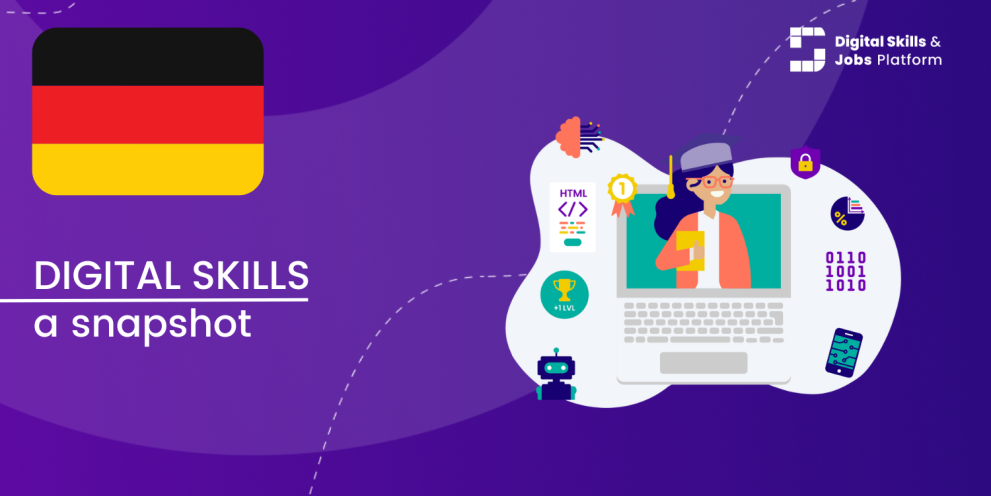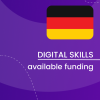Germany: a snapshot of digital skills

Introduction
In the 2024 edition of the Digital Decade report, Germany has achieved 52.2% basic digital skills coverage, compared to the EU average of 55.6%. This puts Germany at 65.3% of the overall target for the EU 2030 goal, which aims to have 80% of the EU population possessing at least basic digital skills. The country has seen an annual growth of 3.3% from the previous year.
According to the Digital Decade report 2024, Germany performs better than the EU average in both digital skills indicators. The percentage of ICT specialists in employment has slightly surpassed the EU average of 4.8%, despite it decreased from 5.0% to 4.9% last year.
Although Germany doesn't have national digital skills and jobs coalition for skills lots of public and private initiatives are organized in each of federal states (Länder) and on federal level. Nationale Weiterbildungsstrategie (National Continuing Education Strategy, or previously National Skills Strategy) under the slogan "Continuity and Awakening," provides concrete measures and new initiatives for the further development of the continuing education system and the strengthening of the culture of digital education. Small- and medium-sized enterprises (SMEs), receive special consideration through access to advice, funding, and continuing education opportunities.
Overview of state strategies and national initiatives
State strategies
Nationale Weiterbildungsstrategie (National Continuing Education Strategy) under joint leadership of the Federal Ministry of Education and Research and the Federal Ministry of Labor and Social Affairs, was presented in September 2022 with aim to increase participation in further training in Germany transforming economy, the labour market and society. Goals of the new strategies include: implement better approaches to enable more low-skilled people to take part in further training; further promote and strengthen qualification-oriented continuing education; the development of necessary skills and any reorientation in working life in the company context (especially smaller companies); to identify and disseminate successful approaches for strengthening digital skills.
Strategy also focuses on strengthening digital continuing education by developing a national online further training platform (NOW!) as an ecosystem based on common standards, formats and interoperable structures.
Federal Government of Germany adopted in 2022 Digital strategy presented by Ministry for Digital Affairs and Transport. The aim of the digital strategy is to improve the framework conditions for the progress of digitization in all areas. Civil society, business, education and science should be able to use the opportunities of digitization and the design possibilities of digital change in the interests of people. The digital strategy provides an overview of the key digital policy projects that each department is responsible for implementing, listing results that are to be achieved by 2025. Strategy focus on modern, efficient and sustainable networks and availability of data and data tools, secure and user-friendly digital identities and modern registers, international uniform technical norms and standards.
For educational ecosystem, strategy aims to establish digital agreement among federal states, action plan for STEM development, further reach of initiatives for girls and women, national education platform offering further education to all, and continuous monitoring and improvements of supporting activities.
National initiatives
Several investments and reforms are incorporated into the digital transition as part of Germany's recovery and resilience plan. Important measures of the plan include investments in a Europe-wide initiative in microelectronics and communication technologies totalling €1.5 billion; investments in a Europe-wide initiative on next-generation cloud infrastructures and services totalling €750 million; and making more than 115 federal and 100 regional public services digitally accessible by 2022 in accordance with the Online Access Act (€3 billion). In addition, the plan will modernise and interconnect registers to reduce the administrative burden on businesses and citizens (€275 million) and establish the first national online education platform to assist learners in acquiring competencies based on their individual learning pathways (€630 million).
Regarding Digital skills, the plan includes investments in four components: providing teachers with digital devices (€ 500 million); creating a national skills platform (€630 million); 3) creating educational competence centres (€205 million); 4) modernising educational facilities of the national military (€100). Investments relating to the Digitalisation of enterprises and the development and integration of advanced digital technologies are included in several measures.
Federal programme ‘Building continuing education and training networks (CET networks) promotes the organisation of training activities, particularly for SME employees. This measure aims to support the establishment or strengthening of professional development networks where companies can benefit from the experience of other firms as well as from advisory and educational centres and institutions. Through the networks and their consultancy, companies are enabled to develop their own strategic staff development plans and find or create optimal training measures. Furthermore, the CET networks will incentivise and support training providers to adapt their offer according to the needs of the companies. In total, 38 CET networks will be financed across Germany until December 2024.
Educational centres of excellence are launched under the leadership of the Federal Ministry of Education and Research and in cooperation with the Länder. Research and the development of digitalization-related advanced training courses for teachers, as well as the establishment and expansion of networks among stakeholders, will receive funding until 2026. The measure consists of four thematic centres of excellence and a networking and transfer initiative driven by science, focusing on STEM subjects, languages, social sciences and economics, creative subjects and sports and digital school development.
With the DigitalPakt Schule (Digital Pact for Schools) the federal government supports the federal states and municipalities in investing in the digital education infrastructure. The goals of the digital pact are the nationwide development of a modern digital educational infrastructure under the primacy of pedagogy. The federal government and the federal states agreed to allocate EUR 5 billion in federal funding to the pact between 2019 and 2024. The aim is to equip all general and vocational schools with modern digital infrastructure. From 2019-2022 around 985 million euros were already invested in schools.
Funding opportunities
Funding opportunities for upskilling and reskilling to support the digital competences of individuals and organizations are available in form of loans, grants and financial instruments. For the period 2021 – 2026 most of the activities in digital transformation are financed through Recovery and Resilience facility but also as activities in Horizon, Erasmus+, ESIF and EEA grant schemes. You may find more on the page of German Recovery and Resilience plan in the article on the Digital Skills and Jobs Platform.






